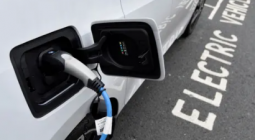Cop26: End trillions in subsidies given to fossil fuel industry, says UN chief – as it happened
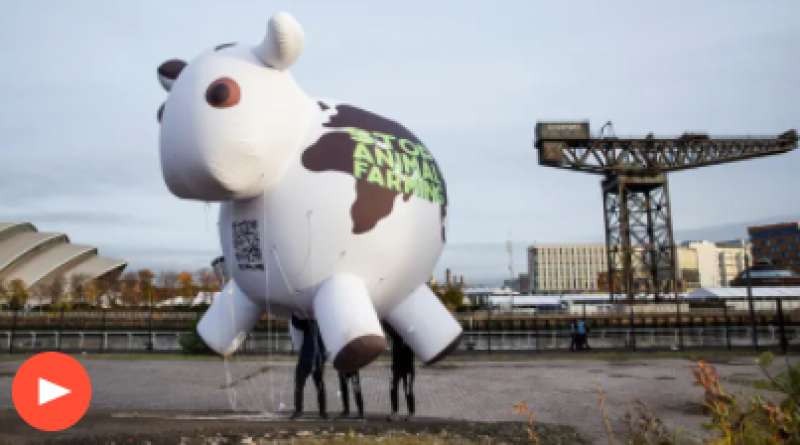
UN chief calls for an end to the trillions in subsidies given to the fossil fuel industry as discussions over the final text contine.
Afternoon summary

When will this all finish? Well that’s it from me on the live blog today, but don’t expect the conference to finish as planned tomorrow evening. Plenty of journalists reporting that it will “drag on until Saturday” as countries argue over the wording of the final text (which among other things should explain how countries are going to keep global heating to 1.5C).
Sticking points certainly likely to include phasing out fossil fuels and what support will be given to poor countries to help them cut greenhouse gas emissions and cope with the impacts of extreme weather.
Here’s a quick summary of what happened this afternoon:
- The optimism around the US-Chinese deal announced yesterday to cut emissions was dampened today by the UN secretary general António Guterres’s criticism of the lack of ambition at the summit and call to end the trillions in subsidies given to the fossil fuel industry.
- Pledges announced at Glasgow on methane, coal, transport and deforestation could nudge the world 9% closer to a pathway that keeps heating to 1.5C, according to a study by the world’s most respected climate analysis coalition. But, it still leaves the world heading towards climate catastrophe.
- Ugandan activist Vanessa Nakate has been giving a voice to those on the frontline of the climate crisis. “We are drowning in promises. Promises will not stop the suffering of people. Only immediate and drastic action will pull us back from the abyss,” she said.
- Scottish First Minister Nicola Sturgeon has been under pressure over Scotland’s failure to join a new alliance that aims to phase out fossil fuels, despite her rhetoric on climate justice and photographs with Greta Thunberg. The UK has also decided not to join the alliance.
- Finally, with one day to go, scientists have been talking of their optimism and anxiety at the progress being made at the conference. While warning that the speed of action was worrying, they believed world leaders were listening to the need to act.
Fifteen years ago you had to be up in the Arctic or in a low-lying island to experience climate change. Today, wherever we live we are seeing the impacts and governments are responding.
*****
Elena Morresi
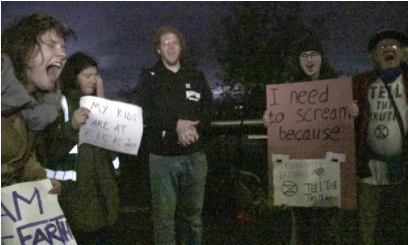
Protesters let out a guttural scream outside the Cop summit in an Emotional Rebellion to the climate emergency.
The action was delayed as police officers, who largely outnumbered the small group of participants, moved demonstrators four times before allowing the small group to ‘Deep Heart Scream’ near the river Clyde.
‘I felt a great release,’ said activist Chrs Philpott. ‘I’ve not had an opportunity to vent my emotions during the summit and now I feel calm, and I realise my grief’.
The group shouted under the Glasgow drizzle against greenwashing, consumerism and for their future and the loss of their children’s futures.
*****
There have been a number of protests by activists outside the conference today (and reports of asylum seekers being advised not to take part), but my colleague Jessica Murray has just spotted one inside the Cop26 conference venue this evening. “The people united will never be defeated,” sing a group of climate justice protesters.
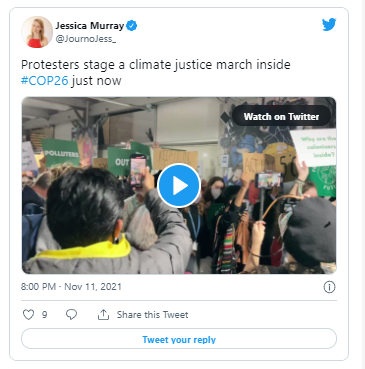
****
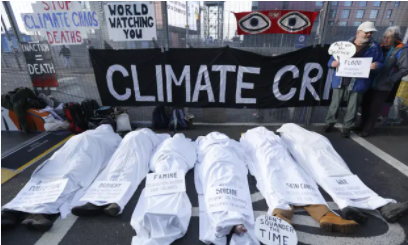
Jessica Murray
Protesters in Glasgow have deflated the tyres of a number of SUV vehicles in the city, and attached “Climate violation” notices to the windscreens.
At least four SUVs in the city’s West End had their tyres deflated, GlasgowLive reports. The flyer attached to the car windscreen reads: “Your SUV contributes to the second biggest cause of carbon emissions rise in the last decade. This is why we have disarmed your car by deflating one or more of its tyres”.
“If SUV drivers were a nation, in 2018 they would have ranked as the 7th biggest emitter of Co2,” it adds.
The Scotsman reports that solicitor Lucy Conn, 31, who lives on Parkgrove Terrace in the West End of Glasgow, left her house at around 12.30pm on Thursday to discover her tyres had been deflated, along with a number of vehicles in the street. However, she said she had been unfairly targeted as her vehicle is not an SUV.
A Police Scotland spokesperson said: “We are aware of these incidents and there will be increased patrols in the area to provide reassurance to local residents.”
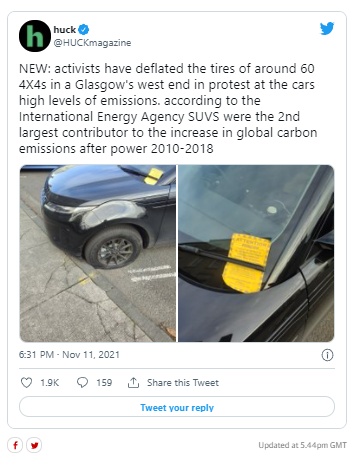
*****
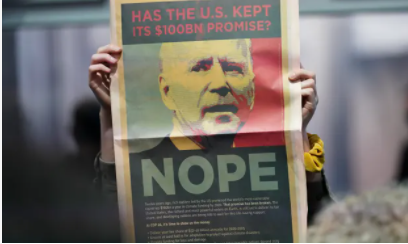
Tom Levitt
My colleague Jonathan Watts has been reporting on scientific reaction so far to Cop26.
How much of a difference the conference will make is fiercely debated, writes Watts. Last week the International Energy Agency said the promises made in Glasgow could put the world on track to limit warming to 1.8C by the end of the century, if every country lived up to its long-term net zero commitments.
But this optimism, Watts writes, was hosed down by a subsequent assessment by Climate Action Tracker, the world’s most respected climate analysis coalition, which showed how weak short-term goals were likely to push global heating to at least 2.4C.
The good news is that scientists believe the reality of climate change is now being recognised by world leaders.
*****

Scottish First Minister Nicola Sturgeon has been under pressure today over Scotland’s failure to join a new alliance that aims to phase out fossil fuels (see earlier post on it).
The campaign group Friends of the Earth has criticised Sturgeon for posing for photographs with leading youth climate activists such as Greta Thunberg and Vanessa Nakate and promising climate action:
Nicola Sturgeon is keen to use the language of climate justice and be photographed with Greta Thunberg but at some point her fine rhetoric has to translate into a commitment to stopping the oil and gas production that is driving the climate crisis. Refusing to join the Beyond Oil and Gas Alliance is a failure to follow through on her Government’s recent change of position to no longer support unlimited oil and gas extraction. To meet the 1.5C goal, we need to keep coal, oil and gas safe in the ground.
Speaking at Cop26 this afternoon Sturgeon admitted that she had not yet done enough to reduce Scotland’s climate emissions.
We are half-way to net zero. We have a target of net zero by 2045, but I am mindful that is meaningless unless we do what is required by 2030. We have a 75% reduction target in Scotland by 2030 which will be tough to achieve. We’re trying to lead by example.
She also talked up the importance of the conference getting an agreement on financial help for vulnerable countries.
We owe a debt to developing vulnerable countries because we’ve created climate change and benefited through generations from emissions pumped into the atmosphere. Finance is key to this, not as an act of charity but reparations. It would be shameful if we came out of Cop26 without that commitment [to provide $100 billion a year in climate finance] in being met in full.
*Poor countries need climate finance to help them cut greenhouse gas emissions and cope with the impacts of extreme weather. They were promised in 2009 that $100bn a year would be provided, from public and private sources, from 2020 to 2025.
The Cop26 climate summit has seen world leaders, big business and international delegations converge on Glasgow promising to tackle global heating.
But outside the closed negotiation doors, activists from around the globe are the strongest voices, holding those in power to account on their environmental pledges.
My colleagues Elena Morresi and Nikhita Chulani followed Fatima Ibrahim, activist and co-director of Green New Deal Rising, as she navigated a day at the climate conference.

*****
Poland has confirmed that it plans to continue burning coal for more than another quarter century, in a statement bound to disappoint those looking for a swift exit from the most polluting fuels.
The central European country was one of the headline signatories of a British-organised pledge to phase out coal last week, a statement also signed by Canada, South Korea and Ukraine, and hailed by the UK government as “marking a milestone moment at COP26 in the global clean energy transition”.
Poland has now confirmed that it will phase out coal by 2049, in line with its existing policy.
Poland’s climate and environment ministry said in a statement: “No responsible government would shun its energy sources overnight, as this would lead to a situation where we could not ensure energy security and there would be no stable power supply.”
It added that it expects coal will be generating between 11-28% of Poland’s electricity supply in 2040. Poland gets 70% of its energy from coal and said the transition would take twenty to thirty years.
Under the “clean power transition statement” major economies have agreed to phase out coal in the 2030 and the rest of the world in the 2040s.
Poland, deemed a high-income country by the World Bank, does not consider itself a major economy.
The Polish government, the last to sign an EU pledge for net zero emissions by 2050, said it was committed to the mid century target. “We are on board for the EU target,” said Adam Guibourgé-Czetwertyński, a junior climate and environment minister.
The presence of coal in the Polish energy mix until 2048 will require other EU member states to do more to hit the 2050 net-zero target. Polish officials argue that is fair, as other European countries have a head-start on Poland, which is more dependent on coal.
The EU’s top climate envoy Frans Timmermans said urgency had increased on phasing out coal across the EU. Speaking on Thursday in Glasgow, he said.
“Even some of our member states only a couple of years ago were saying coal is forever. And now every member state in the European Union knows that there is no future for coal. That happened over a couple of years. So I think the sense of urgency has increased.”
Delegates in Glasgow are wrangling over the COP26 draft agreement, which includes for the first time language on phasing out coal. Timmermans said removing that reference from the text would be an extremely bad signal.
“If you remove it from the text what is the message you are sending there? Because the only way humanity can learn to live within planetary boundaries is if we rid ourselves of dependency on fossil fields that are making our survival impossible.”

